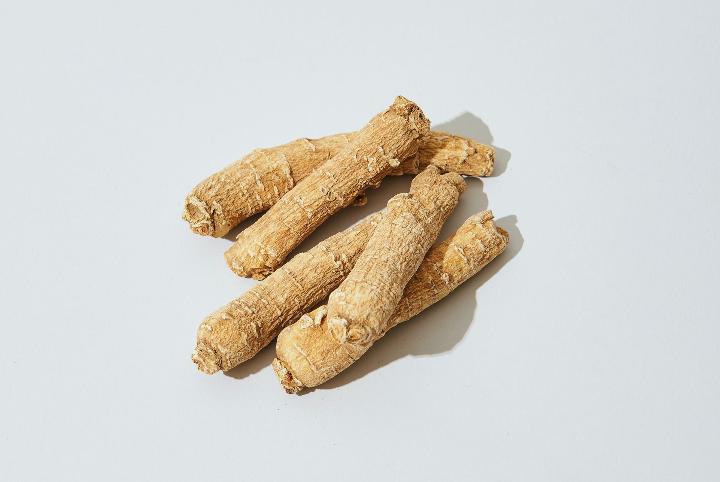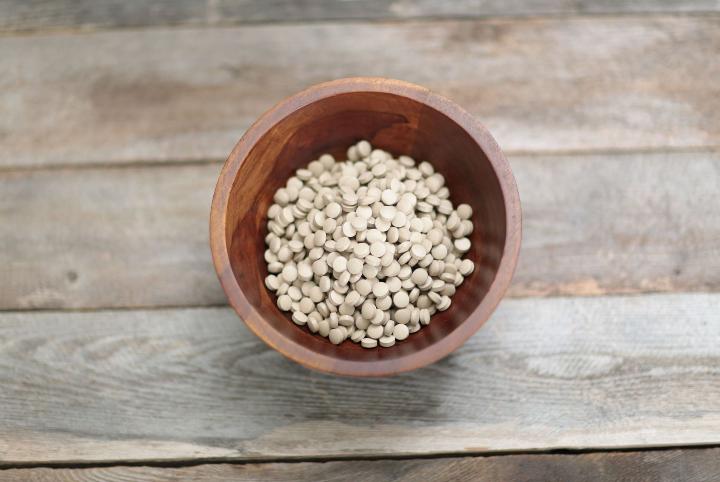As a human experiencing life in the 21st century, you know that each day moves fast and is more demanding than ever.
Long commutes, challenging work days, and being glued to technology from wake to sleep have become the norm. This is not to mention taking care of a home, your family, and furry children — plus keeping up with friendships, relationships, finances, and social life. For these reasons, there’s never been a more opportunistic time to add adaptogenic herbs to your routine. In particular, eleuthero root.
Where Does Eleuthero Root Come From, and Which Names Does it Go By?
Eleuthero root comes from the eleuthero plant, which looks like a flowering woody shrub. It’s native to Northeastern Asia and belongs to the Araliaceae plant family. In China, the root is always considered the most potent part of the plant. You’ll most commonly find eleuthero listed as eleuthero root extract in supplements, teas, and herbal tinctures, but you can also find it as a dried powder.
Eleuthero root has traditionally been used in Chinese medicine for thousands of years to help increase qi (life force energy), invigorate the body, and promote immunity. It’s gaining more popularity as an occasional stress support supplement, nootropic, and for use in athletic performance.
In Chinese, the eleuthero root is called Ci Wu Jia, but it may also be called Wu Jia Shen. It also goes by a few other aliases, including its proper name: Eleutherococcus senticosus, devil’s bush, Devil’s shrub, Shizuoka, touch-me-not, wild pepper, or kan jang. However, Siberian ginseng is the eleuthero root’s most common (but misleading) nickname.
Is Eleuthero Root a True Ginseng?
While Eleuthero Root formerly went by the name Siberian ginseng, it’s not actually a true ginseng. It should not be confused with American ginseng (Panax quinquefolius), Asian ginseng (Panax ginseng), or Indian ginseng (aka Ashwagandha or Withania somnifera, which, ironically, is also not true ginseng).

The main difference between eleuthero root and true ginseng is the active components that give each herb its adaptogenic properties. True ginseng contains ginsenosides, and eleuthero root contains eleutherosides, attributed to its ability to promote increased energy, decrease sensitivity to external stressors, and encourage resilience to occasional stress.
Eleuthero Root Benefits: Why This Adaptogen Is Mother Nature’s “Chill Pill”
Adaptogenic herbs, or adaptogens, are botanicals that promote a healthy stress response and can help increase your resilience to occasional stress rather than heading toward burnout and exhaustion.

To qualify as an adaptogen, eleuthero root must meet three criteria:
It must be non-specific (meaning it assists the human body in a wide range, such as with physical, chemical, or biological stressors). This includes helping offset the negative effects of environmental and interpersonal disharmony.
It must help maintain homeostasis (balance)
It must not harm the normal functions of the human body.
When taken consistently over time, adaptogens like eleuthero root can help you feel more balanced, “chill,” and capable of adapting to life’s circumstances (which is where the name adaptogen comes from). A few other adaptogens you may have heard of are ashwagandha, ginseng, holy basil, maca root, and rhodiola.
The compounds and nutrients found in adaptogens nourish the nervous and endocrine systems and decrease the body’s stress response (more shortly). This promotes reduced tension, enhanced focus, energy, mental and physical stamina, and a greater sense of balance and calm.
While eleuthero root may not be able to do your laundry, walk the dog, or meet deadlines, it contains nutrients to help you carry out those tasks more efficiently.
How Eleuthero Root Supports Your Body Through Occasional Stressful Events
Eleuthero Root benefits occasional stress when you experience an event, like a car accident, running late for work, or a breakup; your body perceives any form of negative stress as a direct threat to your survival.
When said stressful event occurs (even before the brain can fully process it, a distress signal is sent throughout the body to trigger the release of stress hormones, such as adrenaline and cortisol, which sets off a chain of reactions to elicit the fight or flight response.

The fight or flight response in the body is almost comparable to priming a getaway vehicle. The gas tank is full (glucose gets sent into the bloodstream for a burst of energy), and the engine is revved up (stress hormones create physiological changes: dilated pupils, increased oxygen to the brain, and pushing blood to vital organs). Finally, you put the pedal to the metal and speed away at 70 miles per hour (your hearing, sight, and other senses have become sharper, and now you’re ready to run from danger). In the body, this fight or flight response all happens in a matter of seconds.
While the fight or flight response served us well in the hunter-gatherer days, we’re in need of a software update — seeing as the body has no discernment between real, life-threatening danger and being exposed to occasional daily stressors in a fast-paced society.
Repeatedly experiencing the fight or flight response is taxing for all systems in the body and can eventually lead to burnout, brain fog, and physical and mental fatigue. This is where eleuthero root can step in to help mitigate some of stress’s negative effects.
While the claimed benefits of eleuthero root are plenty, scientific research shows that eleuthero root offers a stress-protective effect and can help decrease the body's sensitivity to environmental stressors by regulating key mediators of the stress response.
In your daily life, the benefits of eleuthero may present themselves subtly — such as noticing you’re not as aggravated in traffic, an increased ability to work well under pressure, and not feeling as irritated.
Increasing the body’s resistance to occasional stress and decreasing sensitivity also allows the eleuthero root to enhance mental focus and physical performance. This is why athletes often take eleuthero root extract, sometimes found in natural pre-workout mixes and natural energy drinks.
Eleuthero Root and Immunity
Healthy Lifestyle with Sun Chlorella Eleuthero Supplements Preliminary research suggests eleuthero may help increase immune system activity. Since occasional stress can suppress immunity, it may directly link many health imbalances.

Due to the eleuthero root’s ability to support the nervous system, it may also be helpful for promoting immunity — and, therefore, in supporting the root cause of other health imbalances linked to occasional stress (which a holistic healthcare practitioner can educate you on).
Eleuthero Root Side Effects and Eleuthero Root Dosage
Due to eleuthero root’s ability to promote increased energy and its stimulating effect on the body (although it's not an actual stimulant, like caffeine), it's best to avoid taking eleuthero in the evenings if you have trouble falling asleep or experience insomnia.
Taking more than the standard recommended dose of eleuthero root extract may also cause headaches or GI symptoms, such as stomach pain or diarrhea. However, it’s generally well tolerated by most people. If you experience symptoms when taking eleuthero root, you can cut the dose in half or by a third and work up to the recommended daily dose over time.
Always consult with your healthcare provider before starting a new dietary supplement regimen.
Where to Find Eleuthero Root Supplements
Interested in giving Eleuthero Root a try? Check out our variety of eleuthero root supplements here.
Ready to Find Your Chlorella?
Find your best chlorella that fits your lifestyle. Sun Chlorella offers easy-to-take small tablets, larger tablets, and powder form.

Where Does Eleuthero Root Come From?